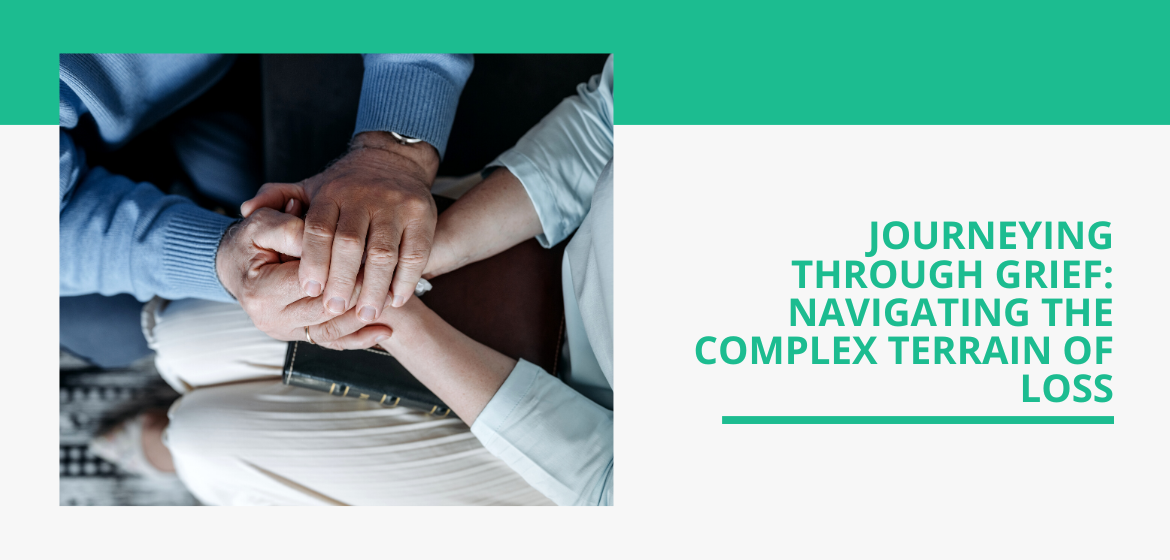
Journeying Through Grief: Navigating the Complex Terrain of Loss
Grief is an intricate and universal human emotion that emerges from the experience of loss. Whether it’s the passing of a loved one, the end of a significant relationship, the loss of a job, or even the disruption of familiar routines, grief can permeate our lives in profound ways. This article delves into the multifaceted nature of grief, its psychological and emotional impact, and offers a comprehensive approach to navigating the complex journey of healing.
The Landscape of Grief
Grief is not a linear process; rather, it is a tumultuous and individualised experience. The well-known model of the “Five Stages of Grief” proposed by Elisabeth Kübler-Ross (denial, anger, bargaining, depression, acceptance) provides a framework, but it doesn’t capture the full spectrum of emotions and reactions one might undergo. Grieving individuals often oscillate between stages or revisit certain emotions, highlighting the intricate nature of their journey.
Understanding the Emotional Terrain
Understanding the emotional terrain of grief is akin to navigating a complex and ever-shifting landscape within the human heart. It encompasses a spectrum of emotions, from the deep wellspring of sadness and longing to the unpredictable currents of anger, guilt, and anxiety. Grief is not a linear progression, but rather a swirling vortex of feelings that can rise and fall like waves, catching us off guard with its intensity. This emotional journey may encompass moments of numbness and relief, reflecting the intricate interplay between loss and the human psyche. Acknowledging and traversing this terrain is vital, for it is through the expression and validation of these emotions that true healing can take root. Just as the landscape of grief is unique to each individual, so too is the path to understanding and finding solace within its complex emotional depths.
The Mind-Body Connection
The mind and body are intricately linked, and grief can manifest physically as well as emotionally. Many individuals experience symptoms such as fatigue, changes in appetite, sleep disturbances, and even physical pain during their grieving process. Understanding and addressing the mind-body connection is essential for a holistic approach to healing.
Coping Strategies for Grief
Coping with grief requires a multifaceted approach that acknowledges the diverse emotional, psychological, and physical challenges that accompany loss. Here are several coping strategies that can help individuals navigate the complex terrain of grief:
- Embrace Your Emotions: Allow yourself to feel the full range of emotions that grief brings—sadness, anger, guilt, and more. Suppressing these emotions can impede healing. Acknowledging them is the first step towards processing and moving forward.
- Seek Support: Connect with friends, family members, or support groups who understand and empathize with your experience. Sharing your feelings and memories can alleviate feelings of isolation and provide a sense of community.
- Professional Help: Consider seeking guidance from a therapist or counselor who specializes in grief and loss. Professional support can offer you coping tools, strategies, and a safe space to express your emotions.
- Self-Care: Prioritize self-care activities that promote your well-being, such as exercise, meditation, yoga, or engaging in hobbies you enjoy. These activities can help reduce stress and foster a sense of normalcy.
- Create Rituals: Establish meaningful rituals to honor the memory of your loved one. Lighting a candle, creating a memory box, or participating in an activity they enjoyed can provide comfort and a sense of connection.
- Write: Journaling or writing letters to your loved one can be a therapeutic outlet for processing your emotions and preserving memories.
- Practice Mindfulness: Engage in mindfulness techniques to stay present and reduce overwhelming feelings. Deep breathing, meditation, and grounding exercises can help you manage distressing emotions.
- Limit Major Decisions: Grief can cloud judgment. Avoid making major life decisions in the immediate aftermath of loss, as clarity may improve with time.
Seeking Support
While grief is a personal journey, seeking support from friends, family, or professionals can significantly aid the healing process. Supportive relationships provide a safe space for expression, reducing the sense of isolation that often accompanies this. Counselors and therapists are trained to navigate the complexities of grief, offering guidance and coping strategies tailored to individual needs.
Cultural and Spiritual Dimensions
Cultural and spiritual dimensions intricately weave through the tapestry of grief, shaping how individuals perceive, process, and express their losses. Cultural norms, traditions, and rituals guide the mourning process, dictating how grief is shared, commemorated, and experienced within a community. These dimensions reflect the collective wisdom of generations and offer a sense of belonging and continuity amidst the pain of loss. Additionally, spiritual beliefs infuse grief with meaning, hope, and connection to the divine. Whether through prayer, meditation, or beliefs about an afterlife, spirituality provides a framework for navigating the profound questions that arise in the wake of loss. As we acknowledge and honor these cultural and spiritual dimensions, we embrace a holistic approach to grief support that respects the diversity of human experiences and fosters healing on profound levels.
The Journey of Meaning-Making
The journey of meaning-making in grief is a profound expedition into the depths of loss, where individuals navigate the complex terrain of their emotions to unearth purpose and understanding. As grief casts its shadow, this journey involves introspection, reflection, and the conscious search for significance amid the pain. It’s a process of weaving memories, lessons, and cherished moments into a tapestry that honors the life that once was. Through storytelling, creative expression, and finding ways to honor the departed’s legacy, the journey of meaning-making transforms grief from a raw and overwhelming experience into a catalyst for personal growth and resilience. This transformative voyage not only fosters healing but also bestows a renewed sense of purpose, allowing individuals to find light within the darkness and derive a deeper sense of meaning from the intricate threads of their grief.
Conclusion
Grief and loss are undeniable aspects of the human experience, deeply affecting individuals across various dimensions of their lives. Navigating the labyrinthine path of grief requires a holistic approach that encompasses emotional, psychological, physical, cultural, and spiritual dimensions. By embracing emotions, seeking support, and actively engaging in healing strategies, individuals can gradually find their way toward acceptance and meaning, transforming their grief into a source of strength and growth. Remember, grief is not a sign of weakness; it’s a testament to the depth of our capacity to love and connect.
























